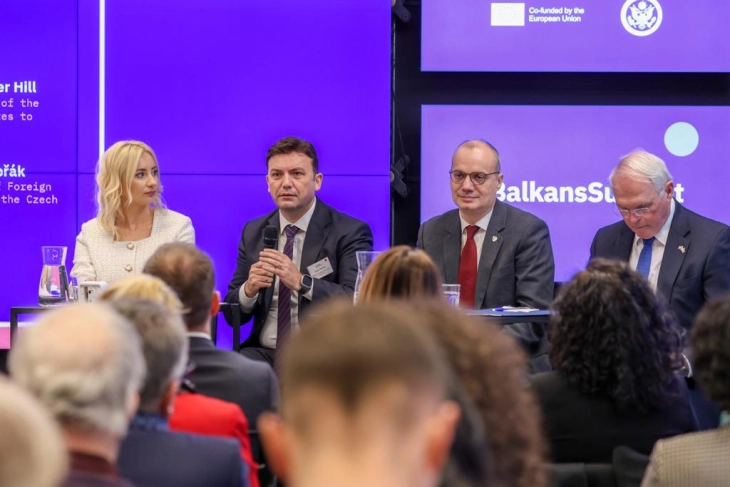Osmani: If region remains wound on Europe's body, it will either bleed or attract malignant influences
- The EU's enlargement is somewhere between a merit-based and a geopolitical approach, which means that its gate opens briefly to let in those who are at that moment prepared to enter, Minister of Foreign Affairs Bujar Osmani said Thursday at the Brussels think tank Friends of Europe's EU-Western Balkans Summit panel discussion on EU Enlargement.

Brussels, 7 December 2023 (MIA) – The EU's enlargement is somewhere between a merit-based and a geopolitical approach, which means that its gate opens briefly to let in those who are at that moment prepared to enter, Minister of Foreign Affairs Bujar Osmani said Thursday at the Brussels think tank Friends of Europe's EU-Western Balkans Summit panel discussion on EU Enlargement.
FM Osmani said this approach resulted in the Western Balkans being sidelined for too long – until the Russian aggression against Ukraine changed the geopolitical situation.
"What we saw was a paradoxical situation. We saw a blue map of the EU with a small gray island of the six Western Balkan countries, about the size of Romania. It looks like a wound on a body. Wounds happen because of lack of circulation. The Western Balkans are gray due to insufficient circulation with the EU and between each other," Osmani said.
He added that if the region was left to wait for many more years "as a wound," it may bleed or attract malignant influences.

In North Macedonia's case, he said, the situation was even more paradoxical and the country had become a litmus test for the EU's credibility in the region.
"People's perception is that the EU has set excessively challenging requirements, not to speed up integration but to discourage candidates and reduce interest in enlargement," Osmani said.
He pointed out that the country had been asked to change its name, which many countries would refuse but North Macedonia did it in the interest of European integration. Then, he said, there were the discussions on historical issues with another EU member state.
"After we did all that, in 2019 they told us, 'We have to change the enlargement methodology and you cannot start the negotiations' after our being a candidate for 17 years," he said.
The country, however, agreed to the new methodology and criteria "because nothing can change our commitment EU membership," Osmani stressed.
In such conditions, he continued, the state promoted the concept of "More integration before membership," in response to the current approach of countries getting all privileges only with full membership.
"It causes frustration for both the candidates and the EU member states," Osmani said. "Candidates do not get anything before making the trip to full membership. And the road is long, bumpy and hard, and you feel the benefits only after membership.
According to him, EU member states were also frustrated because they believed admitting new members would make the bloc less functional.
The proposed concept was to overcome these frustrations, he said. It included being present at the EU discussions related to matters the country was fully aligned with the EU on; gaining access to the European single market; and gaining access to the EU's structural funds even before accession.
He said the aid currently received by regional candidate countries was 11 times lower than the support given to neighboring EU member countries.
"Integration before membership will lead to a situation where getting the official membership will be headline news only in the media, because the citizens will have felt the benefits in their pockets on a daily basis, and the political elites will have been encouraged to implement the reforms because more benefits would be seen during their terms in office," Osmani said.
He stressed that North Macedonia did not want any shortcuts to membership, but respect for the criteria, noting that the country had started the accession process together with Croatia and Slovenia, which have long been members of the EU.
Yet North Macedonia, he said, did not even have access to the single market, and was left waiting — even after meeting requirements — over bilateral issues.
"'More integration before membership' is not an alternative to full membership but a way to bridge the gap between now and 2030," Osmani said, adding that this approach would help the regional countries keep their citizens at home, preventing brain drain and migration to the EU in general.
In his address, Directorate for Neighborhood and Enlargement Negotiations head Gert Jan Koopman said the process of enlargement would resume and this would be confirmed at the EU Summit next week.
According to him, after a long period of limited progress, during which enlargement had come to a standstill and in which the Western Balkan region had perhaps been left "alone for too long," the EU had to make efforts to stimulate the process.
Koopman said the Growth Plan for the Western Balkans was part of these efforts and it should contribute over the next 10 years to the doubling of the region's countries GDP as well as to their integration into the European single market even before full membership.
He also said, ahead of accessing these benefits, the countries should implement the necessary reforms and show results. mr/







